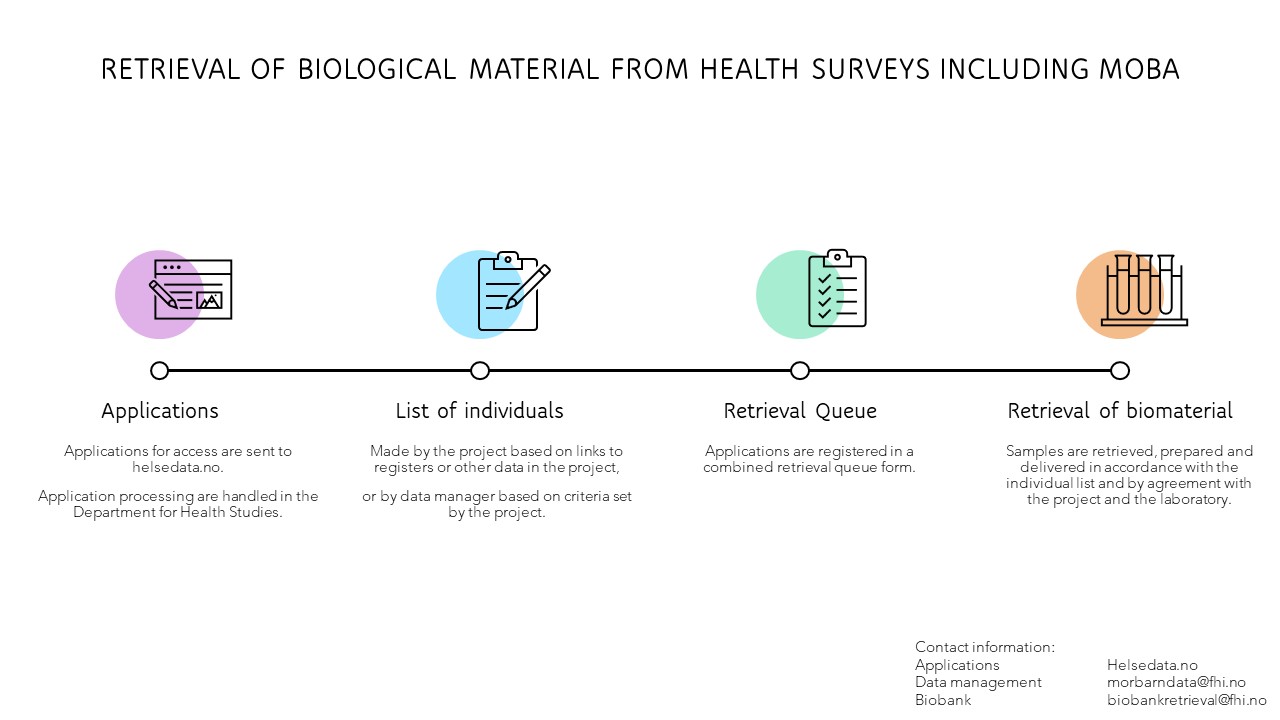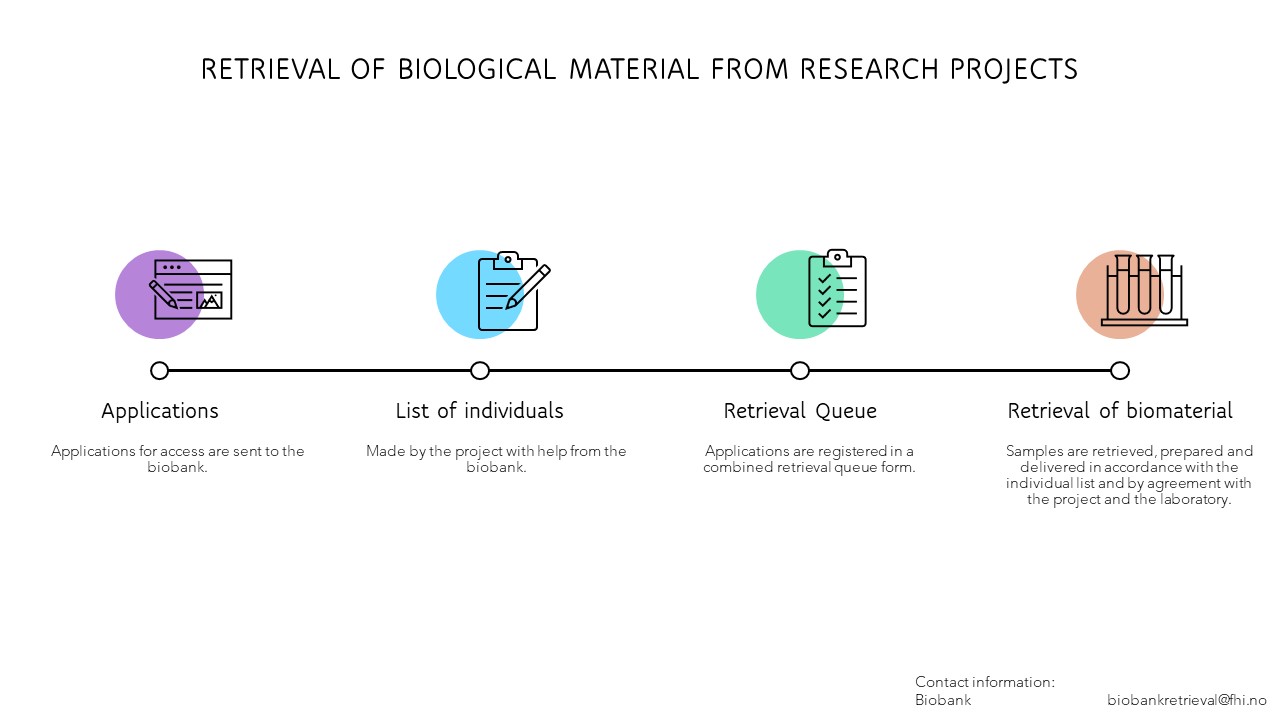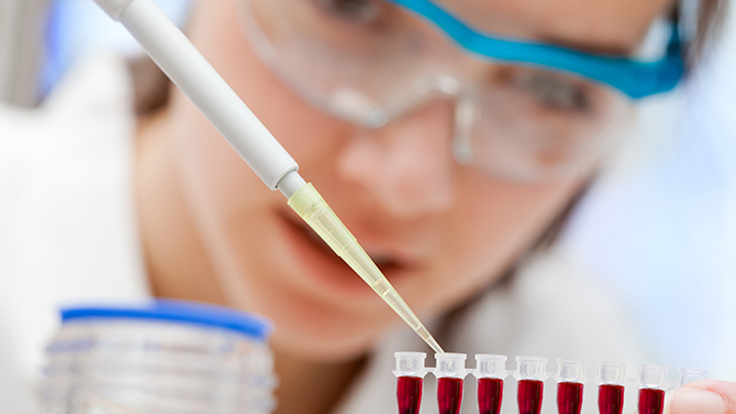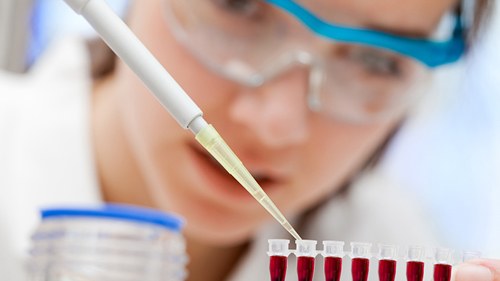Retrieval of biological material
Article
|Updated
The Biobank handles the retrieval of biological material from health surveys and from research projects that store biological material at the Biobank.
The department has both manual and automated methods for retrieval, where type of biomaterial and the volume volume are factors in determining method used.
Requests and applications for the retrieval of biological material are registered in a combined retrieval queue form. The biobank contacts the project when their retrieval is next in line and provides an estimate of when the biological material can be delivered.
Circumstances that may cause delays in delivery:
- Major changes in the application after the biobank has started the retrieval process.
- The project fails to answer questions the biobank has in connection with the retrieval within a reasonable time.
Retrieval of biological material from health surveys including MoBa

Applications for retrieval of biological material from health surveys are registered in the retrieval queue form when the application is approved.
The MoBa Biological material form must be completed and sent to the biobank if this was not done when the application was submitted. The completed form can be sent to: biobank-bioretrieval@fhi.no
The Biobank will require the project to sign a material transfer agreement (MTA) before handing over of the biological material. The project is responsible for making agreements with the laboratories that will analyse the biological material. The laboratories must follow the conditions described in the MTA.
Retrieval of biological material from research projects that store biological material at the Biobank

Requests for retrieval of biological material from research projects that store material in the biobank are registered in the retrieval queue form when the biobank has received a completed criteria form/retrieval form. The completed form can be sent to: biobank-bioretrieval@fhi.no
Criteria form/retrieval form can be downloaded here (only in Norwegian):
Price of the retrieval
The price for the retrieval of biological material is estimated based on expected working hours and equipment/consumables. The Biobank can give a estimate of the price when an application is received and approved. The price will depend on the number of samples, volume/concentration, type of biomaterial and the complexity of the desired set-up.
Table 1 shows examples of price estimates for health surveys (including MoBa) and research projects for standard delivery. For standard delivery of biological material, the samples are randomised and delivered on fixed/solid trays (deep well, semi deep well or microtiter/PCR).
Included in the standard delivery:
- Working time
- Equipment/consumables
- Randomized sample set-up
- Delivery on fixed/solid trays (deep well, semi deep well or microtiter/PCR)
Not included in the standard delivery:
- Specific layout in the trays
- Other types of tubes and/or trays
- Shipment to the analysis laboratory
If the project wants a specific layout, different trays or has other needs, this must be specified in the request/application. This could result in an increased price.
|
|
Number of samples |
Type of material |
Estimated price (NOK) |
|
Health surveys including MoBa |
200 |
DNA |
115 000 |
|
200 |
Plasma |
105 000 |
|
|
1000 |
DNA |
210 000 |
|
|
1000 |
Plasma |
220 000 |
|
|
Research projects that store biological material at the Biobank |
200 |
DNA |
50 000 |
|
200 |
Plasma |
50 000 |
|
|
1000 |
DNA |
100 000 |
|
|
1000 |
Plasma |
105 000 |
Factors that may result increased working hour and thereby increased price:
- Small number of samples (<100 samples)
- Specific study design regarding diagnoses
- Fixed positions in retrieval trays
- Matrix tray (0.5, 0.75 or 1.4 mL)
- Samples aliquoted into several trays
- Manual pipetting for aliquoting (for example for whole blood)
The project will be invoiced for delivery and shipment when the samples have been sent from the biobank.

